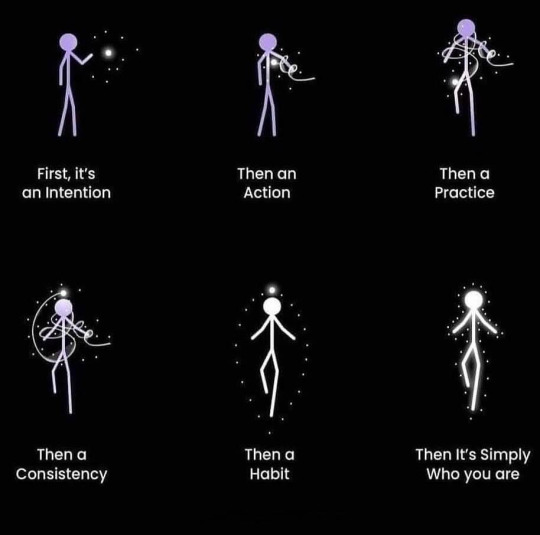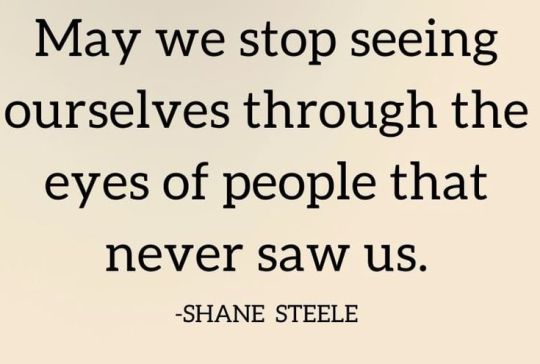Collective ideas shared through reblogs memes and videos. Indulge and enjoy.
Don't wanna be here? Send us removal request.
Text

Excited to share the latest addition to my #etsy shop: Alchemy Library Collection #2 [200+ Ebooks | 1.44+GB] https://etsy.me/3x5mQjp #occult #witchcraft #wicca #magic #magick #grimoire #ebook #alchemy #demonic
4 notes
·
View notes
Text
“Characteristics of the rational soul: self-perception, self-examination, and the power to make of itself whatever it wants.”
— Marcus Aurelius, Meditations (11.1)
591 notes
·
View notes
Text
“Too often, the only escape is sleep.”
— Charles Bukowski
243 notes
·
View notes
Text
“The truth is, unless you let go, unless you forgive yourself, unless you forgive the situation, unless you realize that the situation is over, you cannot move forward.”
— Steve Maraboli
4K notes
·
View notes
Text
Until you make the unconscious conscious, it will direct your life and you will call it fate.
-Carl Jung
455 notes
·
View notes
Text
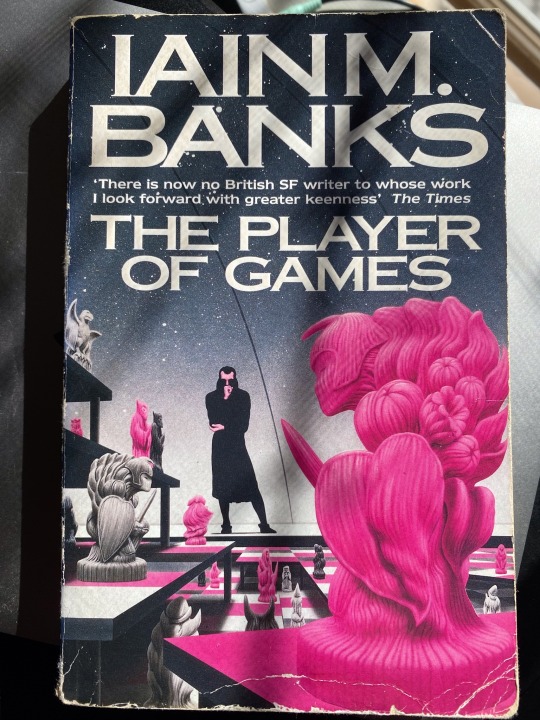
The Player of Games gives the Sign of Silence, calmly pondering his next move.
“To attain the SANCTUM REGNUM, in other words, the knowledge and power of the Magi, there are four indispensable conditions - an intelligence illuminated by study, an intrepidity which nothing can check, a will which cannot be broken, and a prudence which nothing can corrupt and nothing intoxicate.
TO KNOW, TO DARE, TO WILL, TO KEEP SILENCE - such are the four words of the Magus, inscribed upon the four symbolical forms of the sphinx.” - From “Dogme et Rituel de la Haute Magie” by Eliphas Lévi (1854).
37 notes
·
View notes
Text
one of the greatest tragedies in life is that you will always be loved more than you will ever know. someone in class finds your presence inviting and warm, even if you’ve only ever exchanged a few words with them—maybe none at all. someone on the street loves your smile and it gets them down the next few streets. someone you used to be friends with still wishes to fondly call your name. someone you used to be friends with five years ago would give anything to be in the same room as you today. someone who regularly comes into work is disappointed when you aren’t there to brighten their day. someone missed you today. someone noticed you were gone. someone loves you when you’re there; someone loves you when you’re nowhere to be found at all. you think you have always disappeared when you’re no longer in the picture, but you’ve never left the frame.
84K notes
·
View notes
Text
Anything you avoid in life will come back, over and over again, until you’re willing to face it—to look deeply into its true nature.
-Adyashanti
808 notes
·
View notes
Photo
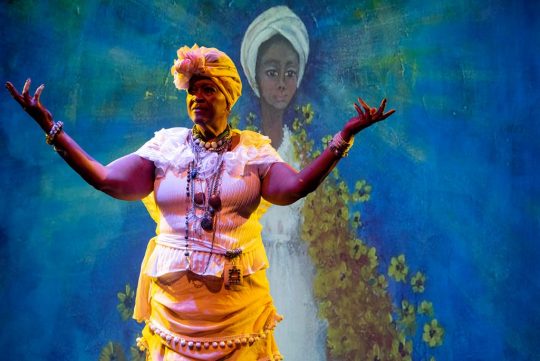
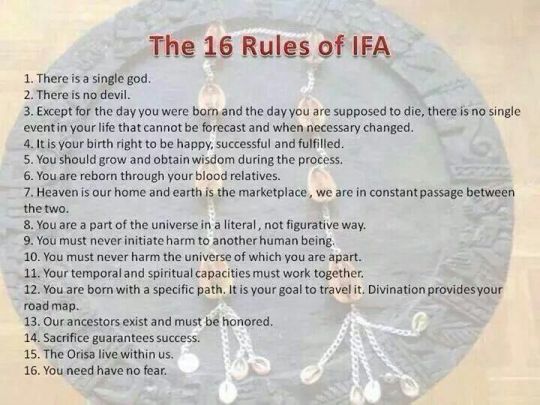
THE IFA CONCEPT OF SOCIOLOGY
Yoruba culture has used the Ifa paradigm of the cosmos as the basis for building their major cities. The structure of the Yoruba Nation was a federation of city states. Each city was ruled by an Oba. In ancient times the Oba was never seen by his subjects, so he became the invisible nucleus of the circle that formed the city. He was surrounded by a female council of elders called Odu and a predominantly male council of elders called Ogboni. The city itself was supported by male and female work parties who tended to divide their labor along gender lines. The men were traditionally farmers and the women traditionally controlled the market place. Both men and women participated in craft guilds that preserved the techniques used in the arts. The cities were built in a circular formation with the compound of the Oba at the center. The symbolic image of Yoruba culture appears as follows:
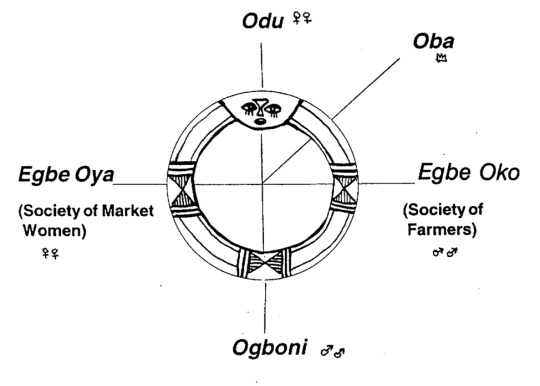
There is some archeological evidence in the Yoruba cities of Ile Ife and Oyo that suggests that this design was used as the basis for the actual layout of those cities. The extent to which this occurred in other cities has not been thoroughly researched. It does appear that this structure was used in pre-colonial times as the basis for establishing political and religious institutions both of which were built upon the cosmological model found in Ifa.
Variations on this structure involved the system of establishing the location for sacred shrines. The system is called Gede which is a very old form of astrology. In Gede the path of solar bodies and planets is marked in relationship to the ways that they transverse the landscape. Celestial bodies are believed to enhance the ase (inherent power) of natural forces that arise from the Earth. By correlating the influences of Olorun and Ile, the ancient diviners were able to consecrate their shrines in places that reflected the essence of specific Odu.
Earth (ile) was considered a reflection of Heaven (Orun) and the layout of Yoruba cities was designed to make them mirrors of the cosmic order. The religion of Ifa originally comes from the city of Ile Ife. In lfa scripture, Ile Ifa is described as the original home of humans. The words: “Ile Ife” translate to mean; “Spreading Earth.” So Ile Ife is a city and it is any place where land formed on Earth that allowed for human evolution to take place. Ifa scripture also refers to Ile Ife as a Spiritual place. It is the home for those ancestors who have returned to Source.

D. THE IFA CONCEPT OF PSYCHOLOGY
Perhaps the most accessible manifestation of Odu is through the portal of individual consciousness. Ifa teaches that Odu represent the energy patterns that create consciousness. They are analogous to what Carl Jung called archetypes of the collective unconscious. Jung believed that there exists a set of primal patterns that form the content of self-perception and place the self in relationship to the world. According to Jung, these patterns remain abstract until the unconscious gives them a cultural and personal context. In both Jungian psychology and the Ifa concept of consciousness, Odu (archetypes) can be revealed through dreams, where they take on personal qualities and manifest as mythic drama. By grasping this particular manifestation of Odu, Ifa teaches that it is possible to create internal balance which is the foundation of living in harmony with Nature.
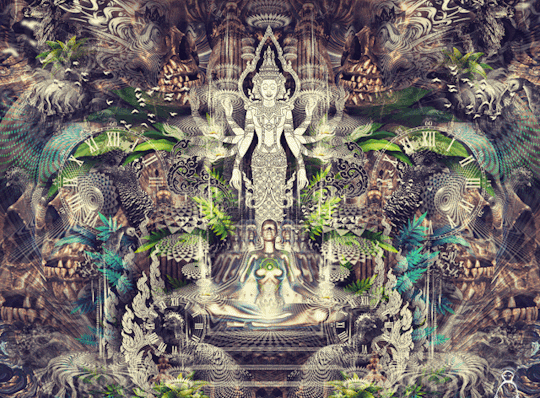
Ifa psychology is linked to the concept of ori. The literal translation of ori is “head.” This is a limited definition because ori also implies consciousness and Ifa cosmology teaches that all Forces in Nature have ori or consciousness.31 Because Ifa believes in reincarnation, every ori forms a polarity with ipori. The ipori is the eternal consciousness that exists in Orun (Heaven).32 It is the ipori that forms the link between past and future lives. If a scripture describes the ipori as the perfect double of ori. According to Ifa cosmology, every ori makes an agreement with Olorun prior to each incarnation.33 This agreement outlines the type of life that is to be lived and the lessons that are to be learned in a given lifetime. At the moment of birth the content of this agreement is lost to conscious thought. Part of the process of establishing internal balance is viewed as the task of remembering the original agreement between ori and Olorun.

This agreement is the source of individual destiny. Because divination is considered a method for discovering destiny, all divination based on Ifa is related to the question of enhancing the alignment between ori and ipori.
The link between ori and ipori lies within ori inu.35 The Yoruba words; “ori inu” translate to mean; “inner head.” This is a reference to what Jung called the individual consciousness or self. Ori inu is the nucleus of that circle of Forces that creates self-awareness.
In addition to the polarity between ori and ipori, ori inu is the center point of the polarity between ara and emi. Ara is the physical body. Ifa psychology includes the heart (okan) and the emotions (egbe) as part of the physical self. According to lfa, the nature of one’s ipori can only be grasped if the head and the heart are in alignment. In other words, the mind and the emotions must be in agreement if spiritual insight is to occur. Similarly, Jung understood that a conflict between the mind and the emotions is one of the sources of mental illness.36 In Ifa this conflict is called ori ibi. It is difficult to make a literal translation of ori ibi, but the term suggests a lack of alignment between ori and ipori. When the ori and ipori are functioning as one, it creates a condition called ori ire. A literal translation of ori ire would be; “wise head.” .Jung referred to this condition as individuation, which was his basis for defining mental health.37
Ara or the physical body exists in polarity with emi. The Yoruba word emi means; “breath.” Ifa teaches that the breath of life comes from Olodumare and contains the eternal essence of consciousness. Emi in this context would translate to mean; "soul.” The Ifa symbol of self would appear as follows:


500 notes
·
View notes
Text
“History repeats itself within your vibration for as long as you allow it to.”
— Ves
296 notes
·
View notes
Link
Mikael Chukwuma Owunna, a queer Nigerian-Swedish artist raised in Pittsburgh, has spent the past two and a half years photographing Black men and women for a series titled Infinite Essence. Hand-painted using fluorescent paints and photographed in complete darkness, Owunna’s subjects are illuminated by a flash outfitted with a UV filter, which turns their nude bodies into glowing celestial figures.
Owunna tells Colossal that the series was his response to the frequent images and videos of Black people being killed by those sworn to protect them: the police. The photographer’s friends, family members, dancers, and one person he connected with on Instagram serve as models for the project, which is named after an idea from his Igbo heritage. “All of our individual spirits are just one ray of the infinite essence of the sun,” Owunna explains. “By transcending the visible spectrum, I work to illuminate a world beyond our visible structures of racism, sexism, homophobia and transphobia where the black body is free.”
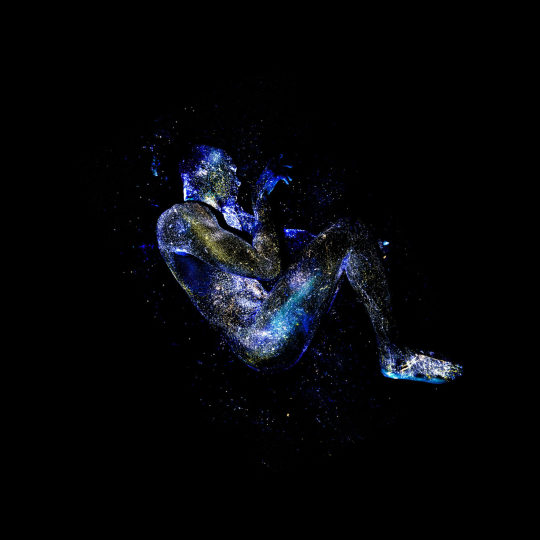
53K notes
·
View notes
Text
“Practice yourself in little things; and thence proceed to greater.”
—
191 notes
·
View notes
Photo

Sigil of Ameth aka Sigillum Dei Aemeth Man’s origin was as spirit, not a physical body. These souls projected themselves into matter, probably for their own diversion. Through the use of his creative powers for selfish purposes man became entangeled in matter or materiality to such an extent the he nearly forgot his divine origin and nature. ~ Edgar Cayce
90 notes
·
View notes
Photo
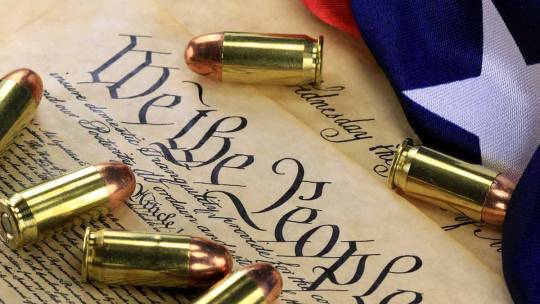
“As a student of history and human nature, I know many fear what they do not understand. I am also keenly aware of the possibilities, that may repeat themselves, should a Citizenry whose degree of liberty and freedoms, never before seen in known human history, ever forfeit their ability to defend, by force if ever necessary, those same freedoms and liberties that allow them life, liberty, and to pursue those joyous experiences that represent peak experiences of the human condition.
History teaches us that people who wield power must be tempered. Plato’s idea of the Philosopher King was such that a King whom, essentially, learning of the several liberal arts and sciences, and becoming closer to God and Nature, and understanding Natural Law, would be embodied with compassion and wisdom and other qualities quintessential for successful and benevolent rulership. But as the currents of time flow in one direction, so too does the truth. As it turns out, this is not enough. Francis Bacon’s ‘New Atlantis’ was a place influenced by an academy known as the House of Solomon, a mythical place where humankind will meet its greatest potential. This place is America; the Novus ordo seclorum (New order of the ages). This order, a Republic founded in the principles of the Constitution, is a system devised to benefit all within its borders; a permanent ‘Philosopher King’ found only in a text that allows America (possibly named after the Merica, the Mandaean Star of Venus, and consort to the King/Pharaoh) to not suffer as our ancestors have, and has allowed each successive generation incrementally more freedom, more well-being, and more opportunity, should we take it. This is not to say we don’t have our modern day challenges. But it is the Second Amendment in the Bill of Rights, not granted by Government, but by God (the philosophical Natural Law), the intrinsic cosmic consciousness and Architect of the Universe, that ensures us at least the opportunity to defend the natural evolution of Liberty and Freedom, and to stop those who would seek to destroy it or take it away from us; for tyranny historically springs forth from the well intended initially. This is perhaps why, in terms of importance, it is the second, after the Amendment which protects our freedom of thought and the ability to communicate those thoughts; the ability to stand up and act, by force if necessary, against forms of Tyranny which throughout the course of Human history has unfortunately, enjoyed many appearances.
Nowhere on Earth is there a ‘Bill of Rights’ so comprehensive with a philosophy founded in Natural Law. This ethos or emergent ethic has its origins in the Judeo-Christian traditions (which can be traced all the way back to Sumeria). This emergent ethic is centered around the individual, which is the most appropriate and logical way to approximate fairness and true freedom in such a large scale as a Nation. The Ethos of America, the cultural identity and source of our greatness, stems from these concepts. This uniqueness in American history does influence us today, particularly those who believe the Second Amendment exists to limit the power of the Federal Government (as the rest of the Amendments do) and to protect our Liberty and personal Freedom henceforth and for posterity; for in a crisis, many times you may be the only one to rely on. It is a matter of individual responsibility. The individual consciousness as the Logos, which carries with it the power to manifest good and evil, heaven and hell, life and death. We require the freedom to think, as is our God given Right, (and therefore Speech, because the thought comes first) in order to manifest our own destiny (I call it the Right to Logos), to develop this inner voice. From our fruits shall ye know us. In order to maintain this Right to Logos, the American ethic of individualism, (which is an ‘emergent ethic’ in its highest form), necessitates you take responsibility for all aspects of your life. Respecting the Individual is of paramount importance in this ethic, which the Bill of Rights attempts to enshrine in the Constitution, in the sense that it is the only proper level for analysis and prescription, of laws, philosophy and political affect. Herein lies my first issue with things like gun control, censorship, prohibition laws in general, and other laws and ideas that seek to control the evolution of the individual.
Another problem I have with gun control in particular, is that it is deeply rooted in racism, if you examine history keenly. Huey P Newton, co-founder of the Black Panther Party in the 60′s once said, “The policemen or soldiers are only a gun in the establishments hand. They make the racist secure in his racism.” It is true that, if you study history, you will find that gun control is rooted in racism and government sanctioned murder. You don’t even have to leave America to see this. Think of what instigated the events at Wounded Knee, which was a failed and illegal attempt of government to secure/confiscate the rifles of natives. Hundreds were murdered…
Attorney Ralph Sherman has, what I think, is a good synopsis of this argument. This was written in 1999:
Legal Opinion by Atty. Ralph D. Sherman April 1999 Blacks and the right to bear arms It’s time to resume my discussion of the history and meaning of the Second Amendment (as requested by several readers). One of the myths that you hear from the gun-ban crowd is that the U.S. Supreme Court has “never” said the Second Amendment guarantees every individual the right to keep and bear arms. Our deceitful President would like you to believe that your right to firearms has something to do with duck hunting. There are several reasons that Handgun Control and company don’t want you to know the truth. One reason is that when you research what the Supreme Court has actually said, you quickly find that “gun control” laws are rooted in racism. Wait. I haven’t turned into some kind of conspiracy nut. If somebody had told me 15 years ago that “gun control” and racial discrimination are inseparably linked in the history of the United States, I would have been skeptical, too. After I started to read some of the old cases and statutes, however, I saw that it is impossible to reach any other conclusion. (In fact I recently gave a talk at UConn on the connections between “gun control” and racial, economic, and sexual discrimination.) Anyone who studies the history of the United States in the 19th Century comes across the Supreme Court case known as the Dred Scott decision. The correct title of the case is Scott v. Sandford (1856), and you can find it in any law library. Usually the case is studied because of its bearing on the status of blacks. Today the Dred Scott case is infamous, a good example of how the Supreme Court can be dead wrong. Dred Scott himself was a free black. The Supreme Court was asked to decide whether a free black was a citizen, entitled to the full protection of the Constitution, the Bill of Rights, and other laws of the United States. The court held that blacks were not citizens, because the founding fathers didn’t have blacks in mind when the Constitution was written. This is no longer the law of our country, thank goodness, because even the Supreme Court corrects its errors, if given enough time. But the Dred Scott case is still important because it is one of the first cases in which the Supreme Court gave its view of the Second Amendment. In this column I don’t have space to discuss most of the decision. But here’s the critical section. The court found it unthinkable that blacks could be considered citizens, because: “[If black people were] entitled to the privileges and immunities of citizens, it would exempt them from the operation of the special laws and from the police regulations which [Southern states] considered to be necessary for their own safety. It would give the persons of the negro race, who were recognized as citizens in any one State of the Union…the full liberty of speech in public and in private upon all subjects upon which its own citizens might speak; to hold public meetings upon political affairs, and to keep and carry arms wherever they went. And all of this would be done in the face of the subject race of the same color, both free and slaves, inevitably producing discontent and insubordination among them, and endangering the peace and safety of the State.” The “special laws” mentioned by the court are the Black Codes, drafted to keep blacks down even if they became free. Essential to the Black Code of every Southern state was a law prohibiting blacks from owning firearms - a total gun ban for blacks only. The “full liberty of speech” is the court’s reference to the right of free speech, guaranteed by the First Amendment. The freedom “to hold public meetings upon political affairs” likewise refers to the First Amendment. And the right “to keep and carry arms wherever they went” - I don’t have to tell you where the Supreme Court found that one. But you can see the meaning as plain as day, in the words of the U.S. Supreme Court. Because of dissatisfaction with the court’s ruling that blacks weren’t citizens, Congress eventually passed the 14th Amendment. This also is quite relevant to the right to keep and bear arms, and anyone who reads this column needs to know why. I’ll explain in a future column. (Source: ralphdsherman.com)
Much of the “black codes” apropos possession of guns, are rehashed in contemporary fashion; except now, the codes are tailored for everyone, not just black people. If my point has not been made well enough, I shall tell you a story of the only Coup D’Etat in U.S. History: “A mob of white supremacists armed with rifles and pistols marched on City Hall in Wilmington, N.C., on Nov. 10 and overthrew the elected local government, forcing both black and white officials to resign and running many out of town. The coup was the culmination of a race riot in which whites torched the offices of a black newspaper and killed a number of black residents. No one is sure how many African-Americans died that day, but some estimates say as many as 90 were killed.” -https://www.npr.org/templates/story/story.php?storyId=93615391
What they neglect to mention is that the “black codes” had disarmed the populace, and they were ill-prepared for the slaughter.
Again, racial tensions are not as high today, and this occurred in the not-so-recent past, however the ugly memes of tribalism, which globally and historically have resulted in Warfare, discrimination, violence, racism, religious killings, terrorism etc. are thriving in some parts of the world, and because history, no matter how small the chance, potentially could repeat itself. To quote Fallout: “War, war never changes”.
“The world is not entirely governed by logic. Life itself involves some kind of violence and we have to choose the path of least violence.” -
The Mind of Mahatma Gandhi.
If you have ever been a victim of any crime, or hate crime, you know that it is a terrible ordeal, and that your peace of mind is disrupted. These things can affect how you perceive the world. I find that many armchair philosophers often come from a highly privileged state of mind, a state that is developed overtime from a perch of relative safety; an Ivory Tower. They underestimate the rate of defensive uses of weapons and overestimate the rate of illegal, criminal acts with firearms, when in fact, according to the CDC, the rate is about equal, or even more defensive uses therefore counter-intuitively avoiding violence.
Defensive Use of Guns
“Defensive use of guns by crime victims is a common occurrence, although the exact number remains disputed (Cook and Ludwig, 1996; Kleck, 2001a). Almost all national survey estimates indicate that defensive gun uses by victims are at least as common as offensive uses by criminals, with estimates of annual uses ranging from about 500,000 to more than 3 million (Kleck, 2001a), in the context of about 300,000 violent crimes involving firearms in 2008 (BJS, 2010)…
A different issue is whether defensive uses of guns, however numerous or rare they may be, are effective in preventing injury to the gun-wielding crime victim. Studies that directly assessed the effect of actual defensive uses of guns (i.e., incidents in which a gun was “used” by the crime victim in the sense of attacking or threatening an offender) have found consistently lower injury rates among gun-using crime victims compared with victims who used other self-protective strategies (Kleck, 1988; Kleck and DeLone, 1993; Southwick, 2000; Tark and Kleck, 2004). - CDC, Priorities for Research to Reduce the Threat of Firearm-Related Violence (2013) https://www.nap.edu/read/18319/chapter/3#15
There is something to be said for the art of complete nonviolence, however this must be cultivated over time. Only two people I know of have mastered it; MLK and Gandhi. I do not doubt other examples can be found, however, it is extremely rare.
Just as one must learn the art of killing in the training for violence, so one must learn the art of dying in the training for nonviolence. Violence does not mean emancipation from fear, but discovering the means of combating the cause of fear. Nonviolence, on the other hand, has no cause for fear. The votary of nonviolence has to cultivate the capacity for sacrifice of the highest type in order to be free from fear. He recks not if he should lose his land, his wealth, his life. -
The Mind of Mahatma Gandhi
I want both the Hindus and Mussalmans to cultivate the cool courage to die without killing. But if one has not that courage, I want him to cultivate the art of killing and being killed rather than, in a cowardly manner, flee from danger. For the latter, in spite of his flight, does commit mental himsa. He flees because he has not the courage to be killed in the act of killing.
The Mind of Mahatma Gandhi
I suggest reading Sam Harris’ The Moral Landscape. He also has a piece called The Riddle of the Gun, which in my opinion is a good philosophical treatise on the issues surrounding guns, both morally and in terms of rational philosophy. Excerpt:
“Most of my friends do not own guns and never will. When asked to consider the possibility of keeping firearms for protection, they worry that the mere presence of them in their homes would put themselves and their families in danger. Can’t a gun go off by accident? Wouldn’t it be more likely to be used against them in an altercation with a criminal? I am surrounded by otherwise intelligent people who imagine that the ability to dial 911 is all the protection against violence a sane person ever needs.But, unlike my friends, I own several guns and train with them regularly. Every month or two, I spend a full day shooting with a highly qualified instructor. This is an expensive and time-consuming habit, but I view it as part of my responsibility as a gun owner. It is true that my work as a writer has added to my security concerns somewhat, but my involvement with guns goes back decades. I have always wanted to be able to protect myself and my family, and I have never had any illusions about how quickly the police can respond when called. I have expressed my views on self-defenseelsewhere. Suffice it to say, if a person enters your home for the purpose of harming you, you cannot reasonably expect the police to arrive in time to stop him. This is not the fault of the police—it is a problem of physics.Like most gun owners, I understand the ethical importance of guns and cannot honestly wish for a world without them. I suspect that sentiment will shock many readers. Wouldn’t any decent person wish for a world without guns? In my view, only someone who doesn’t understand violence could wish for such a world. A world without guns is one in which the most aggressive men can do more or less anything they want. It is a world in which a man with a knife can rape and murder a woman in the presence of a dozen witnesses, and none will find the courage to intervene. There have been cases of prison guards (who generally do not carry guns) helplessly standing by as one of their own was stabbed to death by a lone prisoner armed with an improvised blade. The hesitation of bystanders in these situations makes perfect sense—and “diffusion of responsibility” has little to do with it. The fantasies of many martial artists aside, to go unarmed against a person with a knife is to put oneself in very real peril, regardless of one’s training. The same can be said of attacks involving multiple assailants. A world without guns is a world in which no man, not even a member of Seal Team Six, can reasonably expect to prevail over more than one determined attacker at a time. A world without guns, therefore, is one in which the advantages of youth, size, strength, aggression, and sheer numbers are almost always decisive. Who could be nostalgic for such a world?” - https://samharris.org/the-riddle-of-the-gun/ & https://www.youtube.com/watch?v=I0DYpaLgWIo
We can try to “cultivate the cool courage to die without killing.” But if you are not on that level, maintain your weapon, practice, and assert your Second Amendment Right, based in Natural Law, for the defense of yourself, family, community, and Liberty.”
- The Modern Alchemist
http://didanawisgi.tumblr.com/
417 notes
·
View notes
Photo

“The Skull and cross bones are a continual reminder that the spiritual nature obtains liberation only after the philosophical death of man’s sensuous personality.” - Manly P. Hall
116 notes
·
View notes
